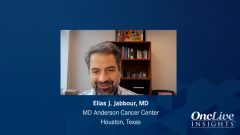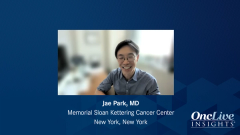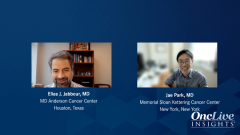
Relapsed Refractory B-Cell ALL: Treatment Overview
The treatment approaches available for patients with B-cell acute lymphoblastic leukemia, and reactions to the availability of novel CAR T therapies for relapsed/refractory disease.
Episodes in this series

Elias J. Jabbour, MD: When we start therapy in the front line, a lot of patients respond well, whether they’re pediatric or adult, but more so in the pediatric setting. They go into remission, but unfortunately, the disease comes back. We’ll discuss MRD [minimal residual disease] in depth and how to handle it. But the point I’m making is that despite the improvement in frontline treatment, patients are still relapsing. Therefore, what’s the unmet need for treatment of relapsed ALL [acute lymphoblastic leukemia]?
Until 2014, we had only chemotherapy and transplantation, and the outcome used to be dismal, with a long-term outcome being in single digits, 5% to 7%. Then we gained a lot of treatments. There was an evolution in the treatment of ALL. In the relapsed setting, we have the bispecific T-cell engagers, such as blinatumomab, a CD19/CD3 that stimulates the T cells to attack the B cells. We have antibody-drug conjugates, such as inotuzumab. Compared with blinatumomab, this drug is an antibody linked to a toxic chemical called calicheamicin. Both blinatumomab and inotuzumab have shown activity in the relapsed/refractory setting better than standard of care.
Then we have 1 of the best innovations in science, the CAR [chimeric antigen receptor] T cells. We have 2 kinds of CAR T cells available and approved, Kymriah [tisagenlecleucel] and Tecartus [brexucabtagene autoleucel]. Tisagenlecleucel is essentially for pediatric and young adults up to age 25 if they’ve had 2 prior therapies. This year, we had approval of brexucabtagene autoleucel from Kite Pharma for patients with multiple-refractory ALL. We’ve seen the outcome of these CAR T cells, which have a survival of 18 months, which is quite great. The question is, can these CAR T cells replace allotransplant? That needs to be figured out. The point I’m making is that we have so many options for ALL, and this will improve doubt. The second question we have to address as physicians is how we choose these drugs. Which will we choose? How should we sequence them?
Blinatumomab and inotuzumab were assessed in randomized trials, and both have shown to be better than chemotherapy. Survival, however, still isn’t great, at 7.7 months for blinatumomab and 7.7 months for inotuzumab. Essentially, patients will respond but can relapse. The question is how we pick among these 2 drugs. We know blinatumomab works better if we have minimal disease rather than bulky disease. Blinatumomab isn’t the best option for patients with high tumor burden. The better option for those patients is inotuzumab. If somebody has liver problems, inotuzumab isn’t the best way to go. If somebody is going for allotransplant, we should be careful with veno-occlusive disease.
We’re trying to combine these drugs together and use a lower dose of inotuzumab to avoid veno-occlusive disease in combination with chemotherapy and sequential blinatumomab, then maybe consider transplant, because transplant remains the only way to go for these drugs. However, as we discussed already, the survival is very short. Therefore, we went to something we think is better, the CAR T cells. These are T cells that came from the patient and are engineered to go back and attack the B cells with CD19 and CD22. We’ll discuss more with Dr Park. This has shown very promising activity, although toxicities are something to manage. CAR T is what transplant used to be in the old days. We’re making progress to manage the CAR T cells and the safety concerns, cytokine release syndrome, and neurological toxicities. These are improving, and the outcome is improving, and we’ll discuss them with Dr [Jae] Park in detail.
Transcript edited for clarity.



































